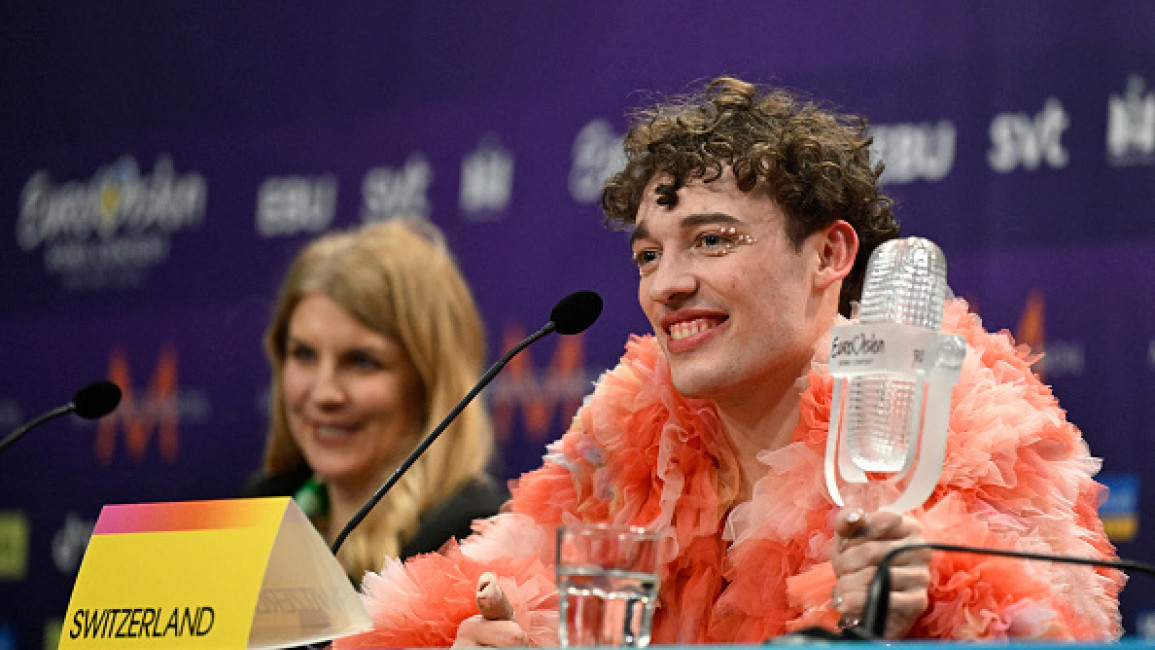Switzerland wins Eurovision Song Contest amid Gaza protests
Switzerland on Saturday won the Eurovision Song Contest 2024 in Swedish host city Malmo, beating runner-up Croatia, after having been among bookmakers' top-three to win the competition.
Billed as a feel-good celebration of European diversity, this year's contest has been thrust into the political spotlight with calls for Israel to be excluded over its military campaign in Gaza.
Swiss rapper and singer Nemo, 24, won the contest with 'The Code', a drum-and-bass, opera, rap and rock song, about Nemo's journey of self-discovery as a non-binary person.
"I hope this contest can live up to its promise and continue to stand for peace and dignity for every person in this world," Nemo said, after receiving the Eurovision trophy on stage.
"To know that a song that has changed my life and a song where I just speak about my story has touched so many people and maybe inspired other people to stay true to their story is the most insane thing that has ever happened to me," Nemo later said during a press conference.
Nemo's Eurovision triumph was the third for Switzerland, and the first since Canadian star Celine Dion won singing for the Alpine country in 1988 with "Ne Partez Pas Sans Moi."
Twenty-five countries competed in the final after Dutch artist Joost Klein was expelled earlier on Saturday due to a complaint filed by a production crew member.
Viewer votes made up half of Saturday's final result, while juries of five music professionals in each participating country made up the other half.
The Eurovision winner is awarded the contest's official glass trophy, which is shaped like a classic, old-fashioned microphone, with sand blasted and painted details. The winner also gets to host the competition the following year.
Croatia's Baby Lasagna, real name Marko Purisic, 28, came second with "Rim Tim Tagi Dim", a song about a young man who leaves home aspiring to become a "city boy" with better opportunities.
Israel's Eden Golan, 20, finished fifth in the contest despite demonstrators' calls for a boycott of the country.
Booing was heard during Golan's performance but also applause, per reports.
The noise was partly audible in the broadcast viewed by tens of millions of people in Europe and around the world.
There was also booing when the points of the Israeli jury were presented.
Several thousand protesters gathered in central Malmo ahead of Saturday's final, waving Palestinian flags and shouting "Eurovision united by genocide" - a twist on the contest's official slogan "United by music".
A few hundred people later also protested outside the venue, chanting "Eurovision, you can't hide, you're supporting genocide."
BREAKING:
— sarah (@sahouraxo) May 11, 2024
Happening right now in Malmo, Sweden.
Absolutely MASSIVE pro-Palestine protest opposing Israel’s participation in Eurovision.
🇵🇸🔥 pic.twitter.com/fftKqQgNZU
Some shouted "shame" at arriving music fans, and facing off with police blocking their path.
Climate activist Greta Thunberg was among those escorted away by police.
Police hauled away some protesters before surrounding and ushering them away, according to news agency Reuters. Some protesters were seen lying on the ground after police used pepper spray to disband the demonstration.
Protesters have been pointing to double standards as the European Broadcasting Union banned Russia from Eurovision in 2022 because of its invasion of Ukraine.
The EBU has insisted it does not play politics.
This neutrality was challenged on Tuesday by Swedish singer Eric Saade, who took part in the opening number of the competition wearing a keffiyeh around his arm.
Two days later, unions at Belgian broadcaster VRT briefly interrupted transmission of the second semi-final to broadcast a message condemning "the violations of human rights by the state of Israel".
Several competitors made reference to peace or love at the end of their performances, including France's Slimane, who said: "United by music for love and peace."
Loreen, last year’s Eurovision champion , said world events were "traumatizing," but urged people not to shut down the "community of love" that is Eurovision.
"What heals trauma … Does trauma heal trauma? Does negativity heal negativity? It doesn’t work like that," she told news agency The Associated Press.
"The only thing that heals trauma for real — this is science — is love."







 Follow the Middle East's top stories in English at The New Arab on Google News
Follow the Middle East's top stories in English at The New Arab on Google News
![Beirut stadium [Getty]](/sites/default/files/styles/image_330x185/public/1235817272.jpeg?h=a5f2f23a&itok=0UZr2fIL)
![Israeli forces destroyed a religious shrine in the village of Shama in southern Lebanon [Getty]](/sites/default/files/styles/image_330x185/public/2184560625.jpeg?h=a5f2f23a&itok=Ge_H4GfP)
![Archbishop Hanna [Getty]](/sites/default/files/styles/image_330x185/public/1232952067.jpeg?h=edfda2ae&itok=ga18er46)